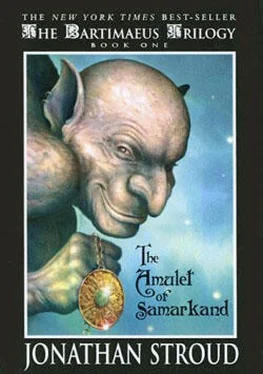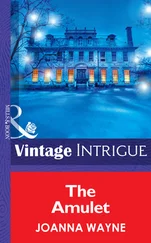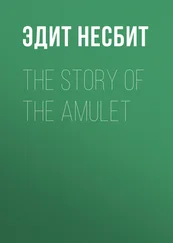I'm no great looker myself, but Faquarl had too many tentacles for my liking.
Not strictly correct. I could have given over the Amulet and thus failed in my charge. But then, even if I had managed to escape from Faquarl, I would have had to return empty—handed to the pale—faced boy. My failure would have left me at his tender mercy, doubly in his power, and somehow I knew this was not a good idea.
Ouch.
All living things have auras too. They take the form of a colored nimbus surrounding the individual's body and are in fact the closest a visual phenomenon gets to becoming a smell. Auras do exist on the first plane, but are invisible to most humans. Many animals, such as cats, can see them, djinn and a few exceptional persons likewise Auras change color depending on mood and are a useful indication of fear, hatred, sorrow, etc. This is why it is very hard to deceive a cat (or a djinni) when you wish it ill.
It would have been a lot more agreeable to return to the urchin immediately to rid myself of the Amulet. But magicians almost always insist on specific summonses at specific times. It removes the possibility of us catching them at a (potentially fatal) disadvantage.
Even magicians are confused by our infinite varieties, which are as different one from the other as elephants are from insects, or eagles from amoebae. However, broadly speaking, there are five basic ranks that you are likely to find working in a magician's service. These are, in descending order of power and general awe: marids, afrits, djinn, foliots, imps. (There are legions of lowly sprites that are weaker than the imps, but magicians rarely bother summoning these. Likewise, far above the marids exist great entities of terrible power; they are seldom seen on Earth, since few magicians dare even uncover their names.) A detailed knowledge of this hierarchy is vitally important for both magicians and for us, since survival frequently depends on knowing exactly where you stand. For example, as a particularly fine specimen of a djinni, I treat other djinn and anything above my rank with a certain degree of courtesy, but give foliots and imps short shrift.
Search spheres like these are a kind of sturdy imp. They possess giant scaly ears and a single bristled nostril, which make them particularly sensitive to magical pulsation and extremely irritable when exposed to any loud noise or pungent smell. For some of the night I was consequently forced to bunker down in the middle of Rotherhithe Sewage Works.
Particularly popular were shards of crystal that were purported to exude life—enhancing auras. People hung them round their necks for good luck. The shards had no magical properties whatsoever, but I suppose in one way they did have a protective function: people wearing them immediately advertised themselves to be magical ignoramuses, and as a result they were ignored by the many factions of feuding magicians. In London it was dangerous for a person to have had even the slightest magical training: then one became useful and/or dangerous—and as a result fair game for other magicians.
Then again… maybe that explains a lot.
There have been cases where a spirit has attempted to refuse a command. On one notable occasion, Asmoral the Resolute was instructed by his master to destroy the djinni Ianna. But Ianna had long been Asmoral's closest ally and there was great love between them. Despite his master's increasingly severe injunctions, Asmoral refused to act. Sadly, though his willpower was equal to the challenge, his essence was tied to the irresistible tug of the magician's command. Before long, because he did not give way, he was literally torn in two. The resulting matter explosion destroyed the Magician, his palace, and an outlying suburb of Baghdad. After this tragic event, magicians learned to be cautious of ordering direct attacks on opposing spirits (opposing magicians were a different matter). For our part, we learned to avoid conflicts of principle. As a result, loyalties among us are temporary and liable to shift. Friendship is essentially a matter of strategy.
Despite what some would say on the subject, many of us have no particular interest in harming ordinary humans. There are exceptions, of course, of which Jabor is one. However, even for mild—tempered djinn such as me, there is such a thing as being pushed too far.
Many great magicians of the nineteenth and twentieth centuries were entombed at Westminster Abbey after (and on one or two occasions shortly before) their death. Almost all took at least one powerful artifact with them to their grave. This was little more than a self—conscious flaunting of their wealth and power and a complete waste of the object in question. It was also a way of spitefully denying their successors any chance of inheriting the object—other mages were justly wary of retrieving the grave goods for fear of supernatural reprisals.
If a magician leaves his circle during a summons his power over his victim is broken I was hoping I would thus be able to leave. Incidentally, it would also have left me free to step out of my own pentacle and nail him.
Yep, by destroying him myself before they got there.
All magicians have two names, their official name and their birth name. Their birth name is that given to them by their parents, and because it is intimately bound up with their true nature and being, it is a source of great strength and weakness. They seek to keep it secret from everyone, for if an enemy learns it, he or she can use it to gain power over them, rather in the same way that a magician can only summon a djinni if he knows their true name. Magicians thus conceal their birth names with great care, replacing them with official names at the time of their coming of age. It is always useful to know a magician's official name—but far, far better to learn his secret one.
Strictly advisable when dealing with subtle, intelligent entities such as myself. It is often possible to interpret a pause for breath as a full stop, which either changes the meaning of the instructions or turns them into gobbledegook. If we can misinterpret something to our advantage, we most certainly will.
Magicians are the most conniving, jealous, duplicitous group of people on earth, even including lawyers and academics. They worship power and the wielding thereof, and seek every chance they can to undercut their rivals. At a rough guess about eighty percent of all summonses have to do with carrying out some skulduggery against a fellow magician, or with defense against the same. By contrast, most confrontations between spirits aren't personal at all, simply because they do not occur of our own free will. At that moment, for instance, I did not dislike Faquarl particularly; well, actually that's a lie—I loathed him, but no more than I had before. Anyway, our mutual hatred had taken many centuries, indeed millennia, to build up. Magicians squabble for fun. We'd really had to work at it.
Minor magicians take pains to fit this traditional wizardly bill. By contrast, the really powerful magicians take pleasure in looking like accountants.
Amulets are protective charms; they fend off evil. They are passive objects and although they can absorb or deflect all manner of dangerous magic, they cannot be actively controlled by their owner. They are thus the opposite of talismans, which have active magical powers that can be used at their owner's discretion. A horseshoe is a (primitive) amulet; seven—league boots are a form of talisman.
Читать дальше









